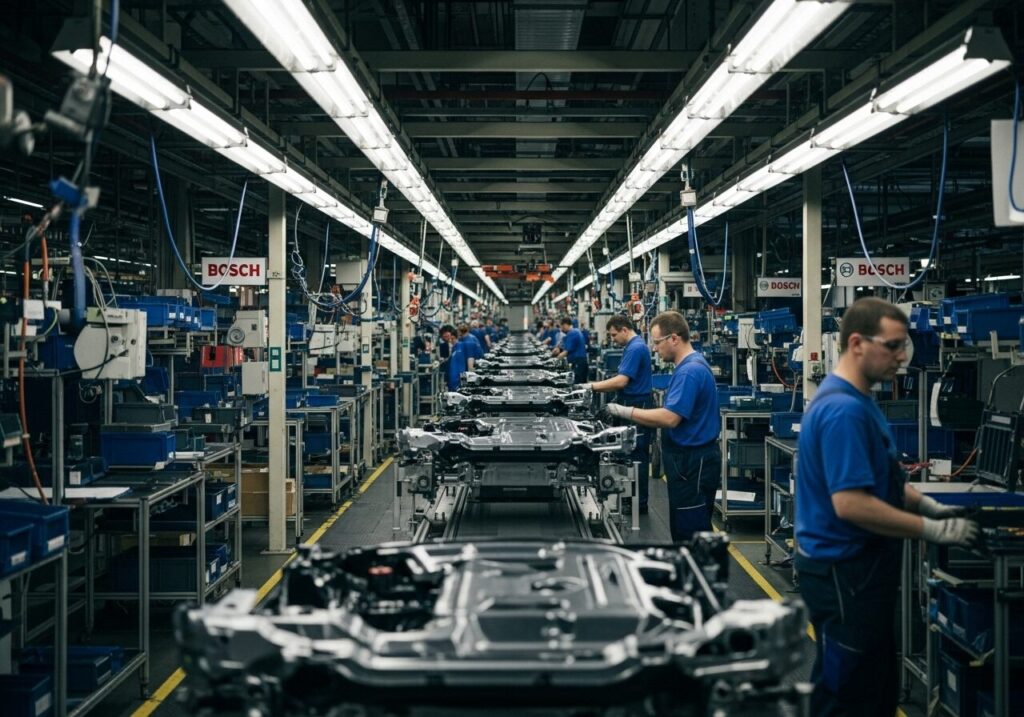The German manufacturing giant Bosch will eliminate 10% of its domestic workforce, citing Chinese competition and high costs.
The job cuts, more than double the previous estimate, will hit Bosch’s automotive division hardest as the company tries to save €2.5 billion annually. This move signals deep structural problems facing Germany’s core manufacturing sector and raises concerns about the future of European industrial jobs.
The German manufacturing and technology giant Bosch announced plans to eliminate over 13,000 jobs in Germany by 2030. This drastic reduction, which affects roughly 10% of the company’s domestic workforce, is a direct response to intense competition, particularly from Chinese rivals, and rising operational costs.
The announcement, made public today, significantly increases the scale of the cuts. Bosch had previously estimated in November that it would need to eliminate 5,550 positions. The new figure more than doubles that initial projection, highlighting the speed and severity of the challenges facing the company.
The cuts are concentrated in the automotive division, which is under pressure to reduce costs by €2.5 billion per year to stay competitive. While the plan affects about 3% of Bosch’s global workforce, the impact is felt most acutely in Germany, the company’s home base.
The pain of the German industrial shift
This move is not isolated. It reflects a wider crisis gripping the European, and specifically German, automotive and manufacturing sectors. Several factors are forcing major industrial players to downsize:
- Chinese Competition: Chinese manufacturers are rapidly gaining market share, especially in the electric vehicle (EV) sector, often offering lower production costs and faster innovation cycles.
- Rising Costs: High energy prices and inflation across Europe have made manufacturing significantly more expensive compared to other regions.
- Global Demand Drop: A slowdown in global demand for new vehicles has compounded the financial strain.
- US Tariffs: Increased tariffs applied by the United States on imports have further complicated export markets.
Bosch’s head of human resources, Stefan Grosch, stated that the group faces “enormous challenges.” The company is struggling to adapt its massive industrial base to the rapid shift toward electric mobility and digital services while maintaining profitability against aggressive international competitors.
Union backlash and the cost of change
The announcement drew immediate and sharp criticism from the powerful German industrial union, IG Metall.
Frank Sell, a union representative in the automotive division, called the reduction a cut of “historic dimension.” He argued that the massive cost associated with the job elimination plan should instead be invested in developing sustainable products and economic models.
The union’s core concern is that these cuts do not guarantee the protection of the remaining German factories. The fear is that the company is sacrificing domestic jobs to fund a global restructuring that may ultimately favor production outside of Germany.
This situation puts immense pressure on the German government, which relies heavily on the strength of its manufacturing sector for economic stability and high-wage employment. When industrial giants like Bosch, which are often seen as the backbone of the economy, announce such deep cuts, it signals a structural shift that affects entire regions.
A wider trend of industrial contraction
Bosch is far from the only major German company making these painful adjustments. The list of manufacturers announcing significant job reductions has grown steadily in recent months:
- Volkswagen plans to reduce its workforce in Germany by 35,000 positions.
- Daimler Truck, the heavy vehicle giant, is cutting 5,000 jobs.
- Other key suppliers like Continental, ZF, and Schaeffler have also announced thousands of cuts.
These collective actions paint a clear picture: the traditional model of German industrial dominance, built on internal combustion engines and complex supply chains, is being fundamentally challenged. The transition to electric vehicles requires fewer parts and different skill sets, making many existing roles redundant.
For ordinary people, this trend means increased job insecurity in traditionally stable, high-paying sectors. It forces workers to rapidly retrain and adapt to new technologies, often under the threat of factory closures.
What this means for the European economy
The Bosch cuts are a warning sign for the entire European Union. Germany is the bloc’s largest economy, and its industrial health directly impacts supply chains and employment across the continent, including in Portugal, which relies heavily on the automotive supply sector.
The core issue is whether European industry can compete on cost with China while maintaining high European labor and environmental standards. The current wave of job cuts suggests that, for now, the answer is no. Companies are choosing to reduce their most expensive operations—those in Germany—to stay afloat globally.
The challenge for policymakers is to find a way to support the transition to green technology without sacrificing the industrial base entirely. If the trend continues, Europe risks losing its manufacturing expertise and becoming overly reliant on foreign production.
The cost of this industrial transformation is measured not just in billions of euros saved by companies, but in the thousands of lives disrupted by job loss.
Bottom Line / Key Takeaway
The decision by Bosch to cut 13,000 jobs underscores the severe structural crisis facing Germany’s core manufacturing sector due to Chinese competition and high costs. This massive reduction signals that the European industrial transition will be painful, forcing workers and governments to rapidly adapt to a new economic reality where traditional industrial jobs are no longer secure.
Source
Expresso. (2025, September 25). Bosch prevê eliminar mais de 13.000 empregos na Alemanha até 2030. Expresso.


